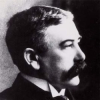Ferdinand de Saussure

Ferdinand de Saussure
Ferdinand Mongin de Saussurewas a Swiss linguist and semiotician. His ideas laid a foundation for many significant developments both in linguistics and semiology in the 20th century. He is widely considered one of the founders of 20th-century linguistics and one of two major foundersof semiotics/semiology...
NationalitySwiss
ProfessionEducator
Date of Birth26 November 1857
CountrySwitzerland